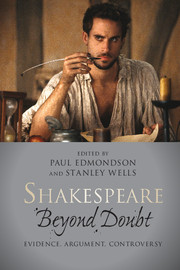Book contents
- Frontmatter
- Content
- List of illustrations
- List of contributors
- General introduction
- Part I Sceptics
- Part II Shakespeare as author
- 6 Theorizing Shakespeare's authorship
- 7 Allusions to Shakespeare to 1642
- 8 Shakespeare as collaborator
- 9 Authorship and the evidence of stylometrics
- 10 What does textual evidence reveal about the author?
- 11 Shakespeare and Warwickshire
- 12 Shakespeare and school
- 13 Shakespeare tells lies
- Part III A cultural phenomenon: Did Shakespeare write Shakespeare?
- Afterword
- A selected reading list
- Notes
- Index
12 - Shakespeare and school
from Part II - Shakespeare as author
Published online by Cambridge University Press: 05 April 2013
- Frontmatter
- Content
- List of illustrations
- List of contributors
- General introduction
- Part I Sceptics
- Part II Shakespeare as author
- 6 Theorizing Shakespeare's authorship
- 7 Allusions to Shakespeare to 1642
- 8 Shakespeare as collaborator
- 9 Authorship and the evidence of stylometrics
- 10 What does textual evidence reveal about the author?
- 11 Shakespeare and Warwickshire
- 12 Shakespeare and school
- 13 Shakespeare tells lies
- Part III A cultural phenomenon: Did Shakespeare write Shakespeare?
- Afterword
- A selected reading list
- Notes
- Index
Summary
Know ye that we, induced by the singular love and affection which we greatly bear the young subjects of our Kingdom in our said country of Warwick, do not lay it a little to heart, that from their cradles they may be imbued with polite literature, which before our times was neglected, [so that] when they become of more riper years, they may go on to be more learned, and increase in number to be useful members of the English Church of Christ,…[we] create erect found ordain make and establish to endure for ever a Free Grammar School in the said town…And that the said school…shall for ever be called and named…‘The Kyng's newe Scole of Stratford upon Avon’.
Of apes and art
How did he do it? A working-class lad from a modest provincial market town (population 1,500) two days’ ride (or ten days’ walk) from London and from the public, purpose-built playhouses that only in his adolescence were being built in the metropolis (the Theatre, 1576; the Rose, 1587), establishing a brand new cultural industry, the one that would occupy his adult life: how did the boy from Stratford-upon-Avon become the playwright who wrote King Lear? Hamlet? Twelfth Night? Measure for Measure? Troilus and Cressida? The Winter's Tale? The eight plays of the double history tetralogy, Richard II to Richard III by way of the three parts of Henry VI, the two parts of Henry IV and the life of the ‘mirror of all Christian kings’, Henry V?
- Type
- Chapter
- Information
- Shakespeare beyond DoubtEvidence, Argument, Controversy, pp. 133 - 144Publisher: Cambridge University PressPrint publication year: 2013



